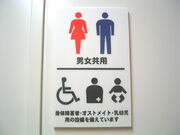
Restrooms(Toilet training)

Japanese sign of the toilet
Restroom(Gender identity)[]
Gender identity refers to a person's private sense of, and subjective experience of, their own gender. This is generally described as one's private sense of being a man or a woman, consisting primarily of the acceptance of membership into a category of people: male or female.[1]
※Madotsuki is using a women's toilet and men's toilets is the age which does not still have the consciousness of the opposite sex?→(which identity becomes rigid, around the ages of 5–7 years?)
Gender identity is formed as children search for social cues and display approval for others based upon the gender with which the child identifies, though gender identity is very fluid among young children. Studies suggest that children develop gender identity in three distinct stages: as toddlers and preschoolers, they learn about defined characteristics, which are socialized aspects of gender; the second stage is consolidation, in which identity becomes rigid, around the ages of 5–7 years; after this "peak of rigidity," fluidity returns and socially defined gender roles relax somewhat.[2]
Restroom(Toilet training)[]
Toilet training, or potty training, is the process of training a young child to use the toilet for urination and defecation, though training may start with a smaller toilet bowl-shaped device (often known as a potty). Cultural factors play a large part in what age is deemed appropriate, with the expectation for being potty trained ranging from 12 months for some tribes in Africa[1] to 36 months in the modern United States.[2]
Restroom(Anal stage)[]
The anal stage, in Freudian psychology, is the period of human development occurring at about one to three years of age. Around this age, the child begins to toilet train, which brings about the child's fascination in the erogenous zone of the anus.

3.Receptive Play (Television)
※There is relevance with developmental psychology called acceptance play "during the period of 3 years old from 1 years old".
Madotsuki's Room(Charlotte Bühler)[]
Charlotte Bühler, geb. Malachowski (* 20. Dezember 1893 in Berlin; † 3. Februar 1974 in Stuttgart) war eine schulbildende deutsche Entwicklungspsychologin mit Weltruf im 20. Jahrhundert.
Several Perspectives on Children's Play: Scientific Reflections for Practioners
著者: Tom Jambor,Jan Van Gils
|
1.Functional Play |
(It begins from 1 years old, decreases from 2 years old at the age of four, and increases after that) |
|
2.Imaginative Play |
(It begins from 2 years old and prospers at the age of four) ... It is also called imitation play.Playing house and store play. |
|
3.Receptive Play |
(It enjoys[ 3 years old ] from 1 years old and a half, and enjoys himself truly from 5 years old at the age of six) ... Television, picture-book → knowledge, imaginative power, and the power of understanding are lengthened. |
|
4.Creative Play |
(It begins from 1 years old and prospers with age) |
The following four kinds are known as a classic classification about play
by Charlotte Bühler
Restroom(Anal stage)[]
3 The conflict in the anal stage
This is the second stage of Freud's psychosexual stages. This stage represents a conflict with the id, ego, and superego.
※Relevance of that it is in an unconscious state in a dream, and formation of ego consciousness.
http://yumenikki.wikia.com/wiki/Madotsuki(name)#Madotsuki.28THE_MONADOLOGY.29

Moderation of money, and toilet training?
Restroom(Anal stage)[]
The negative reactions from their parents, such as early or harsh toilet training, can lead the child to become an anal-retentive personality. If the parents tried forcing the child to learn to control their bowel movements, the child may react by deliberately holding back in rebellion. They will form into an adult who hates mess, is obsessively tidy, punctual, and respectful to authority.
These adults can sometimes be stubborn and be very careful over their money.
